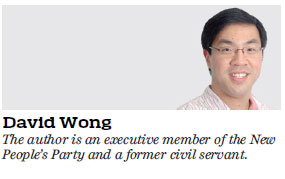'Mother tongue' narrative a trap to divide society
Updated: 2018-06-01 08:40
(HK Edition)
|
|||||||
There is certainly a reason for the current polarization of Hong Kong society. A group of people are continuously and relentlessly finding ways and opportunities to divide our community and create conflict in order to advance their own political gain. Recently, "someone" suddenly discovered an article on the Education Bureau website, published by an independent scholar back in 2013, suggesting Cantonese is not a mother tongue but a Chinese dialect. The key argument of the article is basically sound but the opposition camp still acted as if they had struck gold and immediately mobilized its propaganda machine to stir up division and confrontation in Hong Kong.
Some opposition members thought the incident could be turned into a political flash point. They, along with sympathetic media and reporters, asked the chief executive and secretary for education about their mother tongue. I wholeheartedly endorse the chief executive's reply to the question, which was indeed a silly question, as well as her opinion on the whole matter.
First of all, the article in question is just one of the many articles on one government department's website, and it merely represents the author's personal opinion. It is common practice for public websites to host the views of different scholars and facilitate exchange of opinion. Given the huge number of articles and their very diverse opinion, it is impossible for all of them to represent the government's official position. Yet, the opposition acted as if this one particular article is the official line or, better yet, the secret official line.

Secondly, the article has been around for five years already, why the sudden attention now? Is it because the news cycle is a bit too "quiet" for the opposition? Or are the recent court cases on Mong Kok riots too detrimental to them? It is truly disturbing that opposition politicians, along with sympathetic reporters, keep forcing government officials to denounce the view of the article. Otherwise, they would be betraying Hong Kong residents and scheming to destroy the Cantonese dialect.
This kind of devious tactic is commonly used by members of the opposition. In 2012, they used a segment of one of the many teaching materials compiled by a private publisher to orchestrate a movement against national education. Another similar incident occurred in 2015 when a retired government engineer who planned to set up his private business declared that he believed the Hong Kong Island tramway was obsolete and should be demolished. As ludicrous as it seemed, the opposition made a big fuss out of it and organized a public rally, clearly with an aim to boost their chances in the District Council elections later that year.
In recent years, the main narrative of the opposition has been the relationship between the Chinese mainland and Hong Kong, and so-called "localism". Ever since Zhang Dejiang, then National People's Congress Standing Committee chairman, debunked that some people in Hong Kong used "localism" as a disguise for independence in 2016, the opposition was forced to publicly distance themselves from localists and declared they do not support Hong Kong independence. Nonetheless, they continue to plot various schemes to drive a wedge between the mainland and Hong Kong, such as creating and spreading the rumor of Cantonese being marginalized by the central government.
There are currently seven main Han Chinese dialects - Mandarin, Wu, Gan, Hakka, Xiang, Min and Cantonese. There are tens of millions of people using each of these dialects everyday. Since many of these dialects are not mutually intelligible, Putonghua was conceived after the establishment of the People's Republic of China as the official language to enhance communication. Today, decades later, the seven dialects and many more are still widely used and show no sign of diminishing despite the prevalence of Putonghua. After all, many of us in both the mainland and Hong Kong can easily master at least two dialects. Moreover, even the British magazine The Economist recently did an article applauding the Chinese government's efforts in recent years to promote and conserve the various dialects and minority languages. Therefore, the opposition's repeated accusation that the central government has ordered the chief executive to eradicate Cantonese is nothing but a lie.
Hong Kong has always been a tolerant international metropolis. Not only are there people of the older generation who have come from different parts of China and have non-Cantonese mother tongues, many of us born in Hong Kong do not necessarily speak Cantonese at home and may instead speak English, Urdu (from Pakistan) or Thai among others. The opposition is proudly declaring that the mother tongue of Hong Kong people is Cantonese, thus implying that any of us who do not speak Cantonese do not belong to Hong Kong. This kind of racist and anti-immigrant stance is not only contrary to our treasured core values, it is in fact in violation of the opposition's beloved Western "universal values" and international human-rights treaties and conventions that they keep talking about.
It is time for all of us to stop singing to the opposition's tune, stop declaring on social media that our mother tongue is Cantonese and stop falling into traps that divide us.
(HK Edition 06/01/2018 page12)